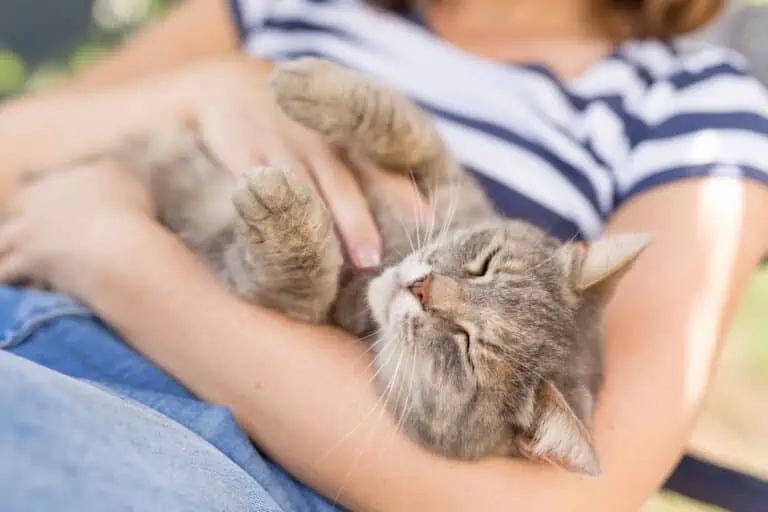-
Shop By Age
-
Kitten
Up to 1 year
-
Adult
1-6 years

Why does my cat gently bite me?
16/04/2024
“Once bitten, twice shy”, as the old adage goes.
When a pet parent receives a naughty little nibble from their conniving kitty, they’re certainly made to know about it!
And that can make us slightly more reluctant to play-along when our feisty felines begin to fool around in the future.
It probably feels like your four-legged fur baby has got it in for you, but these perceived acts of aggression are actually an indicator of affection.
That can be quite difficult to fathom, right? But it’s true; they’re actually “love bites” rather than a defense mechanism.
A cat’s needle-like gnashers will rarely break the skin or draw blood during playtime as there is no intent to injure their playmate.
There are a number of factors that can bring on this behavior, and you’ll be in the “gnaw” after reading through our blog.
What does it mean when your cat lightly bites you?
A “cat love bite” can have a number of connotations, meaning our kitty-cats often send their human companions mixed signals.
Cats will gently bite their offspring when grooming – to dig deep and excavate the dirt – in a delicate and endearing manner.
Repeating these attentive mannerisms with their human housemates is a similar sign of care, kindness and love, providing their teeth are applied with a little tenderness.
In these instances, our four-legged friends are simulating the act of grooming to highlight your value and importance to them, as if you were one of their own litter.
Another reason that your cat might want to lick and nibble you is to get your attention.
They’ll do it to their mother when they want to be center stage amid their sibling rivalry, they’ll do it with their brothers and sisters to instigate fun and frolics and they’ll do exactly the same when ready for playtime with their pet parents.
However, there are occasions when their swift nip of the skin has an ulterior motive. If you’re softly stroking their fur and they suddenly react with a bite – which is a lot more aggressive than usual – then it’s best to refrain from doing what you’re doing.
This is known as pet-induced aggression, which is caused by overstimulation, when periods of interaction have gone too far and they feel that their humans have overstepped the mark!
How do I stop my cat from biting (gentle bites or otherwise!)?
Fine-tuning your feistily independent feline can often be quite a challenge – but changing habits and undesirable traits can be achieved if approaching things with patience and purr-severance.
You might be able to teach an old dog new tricks, such as training them to behave in a certain way, but it’s not quite as easy to educate a cat, even though they are renowned for being a remarkably smart species.
Training a cat is nothing like training a dog. Any pet parent with experience can vouch for that claim. The two are like chalk and cheese in this respect as canines are far more obedient than their feline counterparts.
Cats don’t generally respond well to punishment. In fact, negative feedback is more likely to add fuel to the fire and accelerate our pets’ rebellious streak. They’ll simply want to fight back, which will obviously make their behavior worse.
With this in mind, positive reinforcement in response to good behavior is the way to go. Praising them for good work, and then removing yourself from the situation when they attempt to bite, thus ending playtime, will soon make them realize the error of their ways.
This approach will help them make a connection between conflicting behaviors so they can decipher between right and wrong. Should this fail, it might be worth seeking the advice and expertise of a professional.
When does a cat love bite become a full-on bite?
There’s a fine line between stimulating play and aggressive behavior. Pet parents will, however, be able to read the signs when their cat crosses the line.
When petting-induced aggression, or “cat love bites”, becomes excessive as a response to fear, anxiety, discomfort or territorialism, you’ll know about it.
Reading and understanding body language and recognising behavioral traits in these situations can prevent your pet’s emotions from exacerbating.
Your fur baby will normally be cool, calm and collected prior to applying a non-threatening nip, which isn’t intended to cause harm or break the surface of the skin.
In extreme cases, if your tail-wagging feline intends to take things to the next level, and bite with force, their defensive demeanor would naturally be partnered with intimidating traits such as growling, hissing, exaggerated “meowing” or clawing.
Nobody knows your furry flatmate better than you, so separating non-violent acts and aggressive urges should be quite straight-forward. When the tide is starting to turn, and you’ve read the signs, it’s important to react immediately.
Do I need to speak to a vet if my cat keeps biting me?
Our cats are simply trying to communicate with their comrades when ‘lashing’ out. If they look like they’re adverse or intolerant to some form of contact, and they’re firing off warning signs, then slowly distance yourself from that situation.
If “cat love bites” or stronger versions of biting become a constant issue, and your pet’s aggression is becoming a serious problem, consult your vet for assistance. There might be a deeper-lying dilemma that needs investigating.







